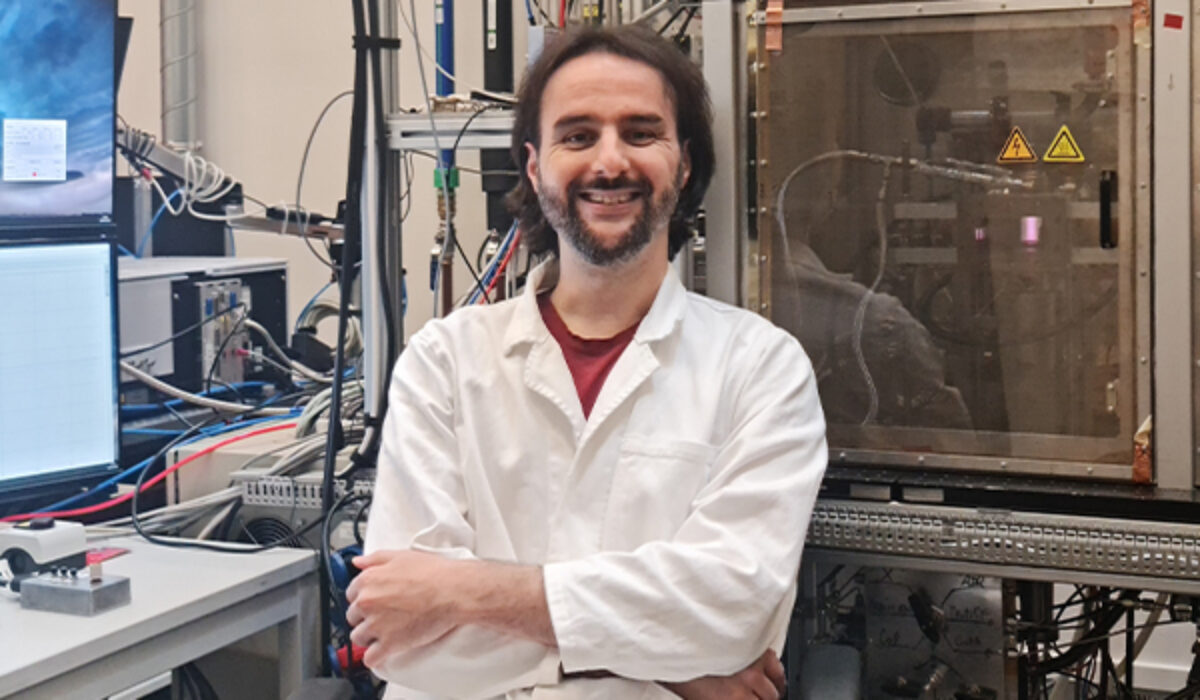29 September 2022

The ARC CBBC has various partners, from both industry and academia. However, we look beyond these partners to fit the needs of expertise within our projects. Sometimes, expertise from outside the consortium is required, which asks us to broaden our range of collaborations. But how do we fit the needs of our projects with the institutes that deliver this expertise? Let’s find out by looking at a fine example: the project of our postdoctoral researcher Floran Peeters.
The first steps of this collaboration were made in 2020, when the Dutch Institute for Fundamental Energy Research (DIFFER) set up a short term project together with BASF. Under leadership of Floran, who worked for DIFFER at the time, its potential proved to be large enough to invest more time and resources. The follow up project was set up through the ARC CBBC involving the Technical University of Eindhoven (TU/e). Floran became member of the research group at the TU/e, and started the next phase of his research.
So what makes his research so special? And how does this unique collaboration facilitate in scientific progress?
More sustainable alternatives
Floran’s project is about the production of nitric oxide (NO), or rather how this production can be made more efficient. NO is a chemical that is used as a precursor to make polyurethane (PUR) polymers for example. Because NO is frequently used in the chemical industry, it is important to produce it in a sustainable way.
Currently, NO is produced by first making ammonia (NH3) using hydrogen through the so-called Haber-Bosch process. This process, however, has a major downside: it is the second most greenhouse gas emitting process in the chemical industry, as the hydrogen that is used in the reaction is often still produced using fossil fuels.
As an alternative to this Haber-Bosch process, Floran studies a direct method to produce NO, without using hydrogen. “When using only one reaction to produce the NO, we can simplify the process”, Floran explains. “And, by using oxygen and nitrogen, which can both be easily extracted from the air, this method eliminates the need of polluting fossil fuels.” This means that this method does not only simplify the process, it also makes the use of fossil fuels redundant.
Heat wave
The problem with Floran’s method, however, is a challenging one. In order to kick start the reaction between nitrogen and oxygen to make NO, a stunning temperature of over 2,200 °C is needed. This is more than twice the temperature that is needed for the Haber-Bosch process. Unfortunately, regular chemical industry setups fail to meet this temperature demand. This project needs a different reactor, different from the ones currently used by the energy sector Fortunately, DIFFER has exactly what this reaction needs.
DIFFER is an organization that is an expert in the field of plasma physics. For example the realization of fusion energy, a new type of fossil fuel free energy. To realize this, they build a so-called ‘sun on earth’. Sounds useful to our temperature problem, right?
Floran’s project uses principles similar to this ‘sun on earth’. Both projects turn their gases into a plasma, where all molecules break down into a cloud of loose atoms. This plasma can reach temperatures up to 5,000 °C, comfortably exceeding the temperature that is required for our new reaction. Is DIFFER the missing puzzle piece for realizing this reaction, and is this plasma method the key to making the production of NO more sustainable?
Energy efficiency
Still, there are some hurdles on the road towards the application of Floran’s plasma method. Mainly, the energy efficiency of this method is rather low. Given that the hydrogen for the Haber-Bosch process can, in theory, also be made in a green way, without using fossil fuels, the future of the plasma method relies on increasing its energy efficiency. Given this new challenge, Floran is currently working on introducing catalysts to the reaction, and his first results are promising.
Floran’s project is a great example of how the expertise exchange within the ARC CBBC helps different organizations reach great heights. The fundamental knowledge from the Technical University of Eindhoven, the industrial expertise from BASF and the expertise on plasma physics from DIFFER together contribute to giving this project great potential. A true way of reinventing chemistry together.